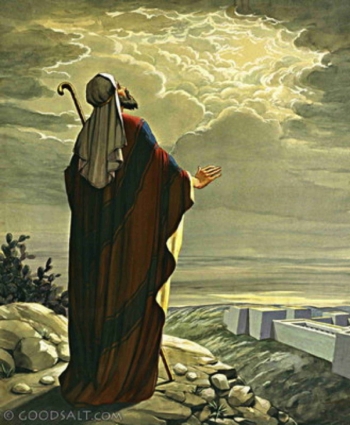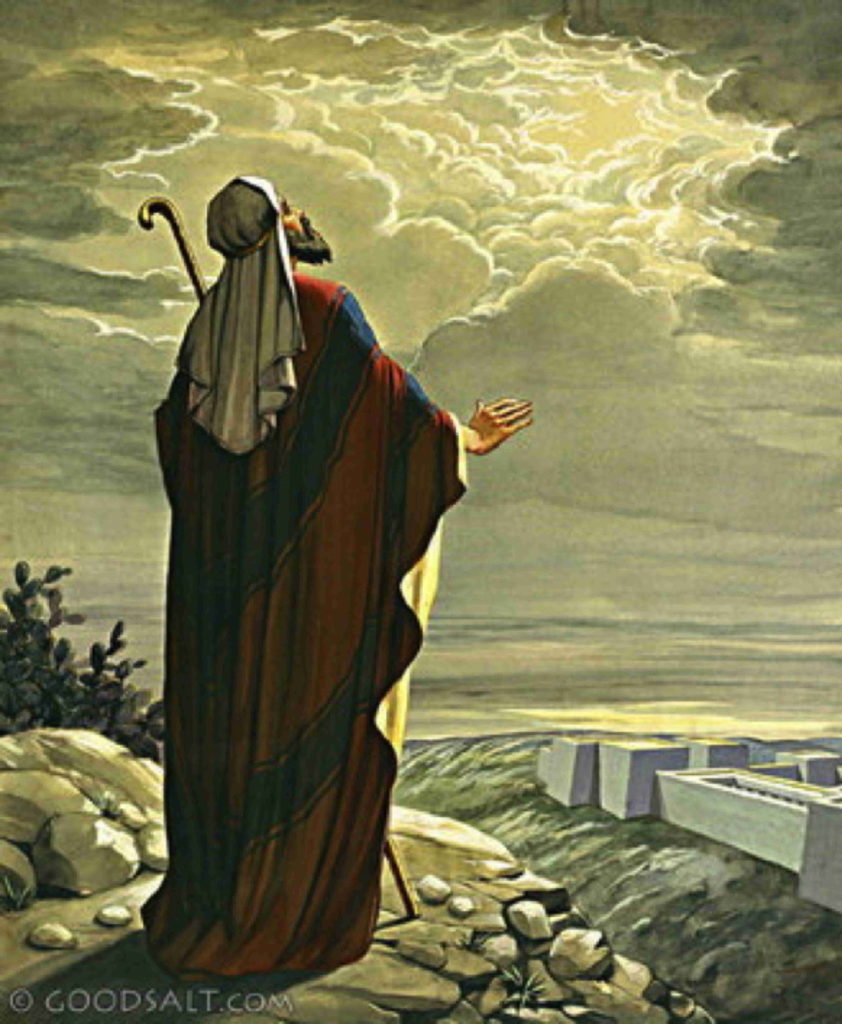
.png) Jacob Peenikaparambil
Jacob Peenikaparambil

A prophet is committed to truth and justice in a situation where truth is distorted through spreading falsehood, and justice is denied to people, especially the poor and the marginalized. Rising inequalities, discriminations based on race, caste, religion, gender etc., and misuse and abuse of power are the main reasons for denial of justice. Violation of human rights and genocide are the worst forms of injustice. The consecrated persons, because of their call to become radical disciples of Jesus, are obliged to be prophets and champions of justice and truth.
Jesus was primarily a prophet. There is a huge difference between a devotee of Jesus and a disciple of Jesus. A devotee of Jesus is satisfied with adoring and worshipping Jesus. Devotees promote religiosity based on rituals, devotions, prayers, fasting, penance, pilgrimage etc. On the contrary, a disciple of Jesus is expected to be a spiritual person who lives the core values taught by Jesus: forgiveness and reconciliation, sensitivity and compassion, justice, non-discrimination and inclusiveness and respect for human dignity and human rights. Prophets, irrespective of the religion to which they belong, are spiritual persons.
Prophets of the Old and New Testaments were highly spiritual persons and they often denounced religiosity that makes people superstitious and makes religion a business. They spoke passionately about the need for transformation and practising moral and ethical values. Examples are many both in the Old Testament and the New Testament. Jesus’ fierce criticism against the Jewish religious leaders (Mt. 23: 1-36) was not only a denouncement of religiosity and hypocrisy, but also exploitation of the people in the name of God and religion. Jesus driving away the traders from Jerusalem temple was a strong reaction to commercialization of religion. Jesus declared, “My house will be a house of prayer; but you have made it a den of robbers.” (Lk.19:46) Another classic text that denounces religiosity and demands doing justice is Amos 5:21-24.
“I hate, I despise your religious festivals;
your assemblies are stench to me.
Even though you bring me burnt offerings and grain offerings,
I will not accept them.
Though you bring choice fellowship offering,
I will have no regard for them.
Away with the noise of your songs!
I will not listen to the music of your harps.
But let justice roll on like a river,
righteousness like a never-failing stream”.
Challenges to Prophetic Role
In the context of India today, women and men religious have to face different challenges. The most dangerous challenge to all Indians, especially to the radical disciples of Jesus, today is Hindutva. India is being converted into a Hindu Rashtra: a caste-based hierarchical and patriarchal society on the pattern of Manu Smriti. As Hindutva ideology is exclusive, divisive, discriminatory, toxic and hateful, it is diametrically opposed to the values of the Kingdom of God and the core values of Indian Constitution. Core constitutional values: Secular democracy, Justice, Equality, Liberty, Fraternity and Individual dignity are being destroyed. People are being brainwashed with this divisive ideology. That is why Pew Research in one of its surveys found that 63% of Hindus believe that in order to be an Indian one has to be a Hindu and 59% Hindus believe that to be an Indian one has to speak Hindi.
Democracy is being derailed by reducing the Parliament into a rubber stamp, as crucial Bills like CAA, abrogation of Article 370, the three controversial farm laws were passed without any discussion in the two Houses and any study by Parliament Committees, and without consulting states or taking feedback from the public. The government has become all powerful without being accountable to the Parliament. Any criticism of the government is not tolerated. Critics are branded as anti-national, Maoists, Tukde Tukde Gang. Rampant human rights violations are taking place because of the misuse and abuse of the draconian laws like Unlawful Activities Amendment Act (UAPA), National Security Act (NSA) and Sedition Law.
Hundreds of social activists, political opponents, journalists and student leaders are put behind bars by making use of these draconian laws. Investigating agencies like CBI, National Investigating Agency, and Enforcement Directorate are being used against the opposition party leaders and those who criticize the government and its ideological mentor, the RSS. According to A database, 96% of the sedition cases filed against 405 Indians for criticizing political leaders and government over the last decade were registered after the Narendra Modi government came to power in 2014.
The minorities, especially the Muslims, are discriminated, demonized, lynched, publicly flogged and their houses and establishments are bulldozed when they protest against the atrocities committed against them, by the state and non-state actors. For example, the journalists of Article-14.com have documented 85 cases of violence against Muslims by cow vigilantes during 2015-19. Most of these cases of violence resulted in the death of the victims.
Judiciary has become pliable because of the infiltration of majoritarian ideology among the judges, and judges do not have the stamina to resist the pressure from the Executive. Judiciary often fails to fulfill its tasks. The Supreme Court is sleeping over a few cases that are fundamental to the Constitution of India. For example, petitions challenging CAA, Abrogation of Article 370, Electoral Bonds, bail pleas of those arrested in Bhima Koregaon Case.
Another serious challenge is increasing gender discrimination and rising crimes against Scheduled Castes (SC), Scheduled Tribes (ST) and women. Crimes against SCs and STs increased by 9.3% & 9.4% respectively, according to National Crime Records Bureau (NCRB) report 2021. As per the NCRB report released in August 2022, the rate of crime against women, (number of incidents per one lakh population) increased from 56.5% to 64.5% in 2021-2022.
Rising inequalities between the rich and the poor is leading to increase in poverty and it is a great challenge to those who work on the issues of justice. The top 1% and 10% of the population own respectively 33% and 65% of the country’s total wealth; the bottom 50% own a meagre 5.9% of the total wealth, according to World Inequality Report 2022 released by World Inequality Lab. The wealth of the top 9 billionaires in India is equal to the wealth of the bottom 50% population. Niti Aayog, using the Multidimensional Poverty Index (MPI), has calculated that 25% of Indians are poor.
As radical disciples of Jesus, are women and men religious aware of the dangerous socio-political changes taking place in India? If they remain indifferent, they are worse than the priest and the Levite in the parable of the Good Samaritan.
In order to fulfil the prophetic role, the religious (consecrated persons) have to cultivate in themselves three qualities: compassion, courage and consistency.
Compassion is the most significant quality of a prophet. Compassion does not mean doing charity out of pity. To have compassion means to empathize with someone who is suffering and to feel compelled to reduce the suffering. What does the Bible say about compassion?
True compassion emanates from the concern and commitment for human dignity. Jesus healed many people because people with dreaded diseases were ostracized from the community and they were treated as untouchables and outcastes. Jesus wanted to restore their human dignity by healing them and reintegrating them with the community.
Courage or fearlessness is another predominant quality of all genuine prophets. They are not afraid of the consequences like suffering, humiliation, isolation, imprisonment and even death. The prophets of the Old Testament and the New Testament prophets, John the Baptist and Jesus, are outstanding examples of courage. They were fearless. They chastised the oppressors and the wrongdoers. John the Baptist fearlessly challenged Herod for keeping his brother’s wife. For, John had been saying to Herod, “It is not lawful for you to have your brother’s wife.” (Mk. 6:18).
A video communication by Fr. Stan Swamy on the eve of his arrest by National Investigation Agency (NIA) demonstrates his courage. “What is happening to me is not something unique happening to me alone. It is a broader process taking place all over the country. We are all aware that prominent intellectuals, activists, writers and student leaders are put in jail because they have raised questions and expressed their dissent with the government. I am happy to be a part of this process, because I am not a silent spectator, I am part of the game. I am happy to pay the price whatever it may be”. Truly a prophetic statement. He paid the price by his death.
Consistency is the third quality of a prophet. Prophets never give up. They are not defeated by setbacks; they continue their fight for justice irrespective of the result of their struggle till the end, as Fr. Stan Swamy did. A dialogue from the Hindi movie Dev based on the 2002 Gujarat riots is very pertinent. Amitabh Bachchan, playing the character of an upright police officer DEV, makes an inspiring statement which every prophet should be able to say.
“Death of a person takes place when he/she fails to oppose injustice wherever he/she sees it taking place. The issue is not whether I succeed or fail. The issue is not whether I live or I am killed. The issue is whether I perform my duty, whether I do it honestly. As a human being, do I fight for truth, for the victory of truth? Whether it is victory or failure, the duty of a warrior is to fight till the last breath, till the last drop of blood. Meaning of life is to always struggle for truth and Justice.”
Three Contemporary Prophets
Fr. Stan Swamy, who had dedicated his life to struggle for justice to the Adivasis of Chotanagpur, saw and experienced the injustice done to the tribals through exploitation, expropriation of their resource and their extermination through displacement. He had compassion for them. He decided to put an end to it by using non-violent means of taking recourse to legal routes and peaceful protests. His various efforts to get justice for Adivasis landed him in jail. The 85-year-old tribal activist who was suffering from various ailments, including Parkinson, was falsely accused in the Bhima-Koregaon case and was incarcerated in prison for 8 months during Covid 19. He died as a victim of Covid 19 while being a detente.
Dr. Sudha Bharadwaj, who was arrested and incarcerated in jail along with Fr. Stan Swamy and 14 other human rights activists, observed the blatant exploitation of workers and denial of human rights of the Adivasis. She had intense compassion for them. She decided to dedicate her life to fight for the cause of workers and the Tribals through their legal empowerment and challenging the mighty corporates and the governments that support them. After being in prison for more than two years, she got bail. But she continues her struggle for the cause of the people to whom justice is denied.
Teesta Setalvad, a journalist-cum-human rights activist, could not tolerate the grave injustice done to the victims of 2002 Gujarat riots by the communal forces with the connivence of the state. She decided to stand with the victims by fighting their cases in various courts. Her relentless efforts resulted in 120 or so convictions in different cases. Despite her arrest in June 2022 and incarceration in jail for about two months, she continues her fight for the rights of victims of 2002 Gujarat riots.
The women and men religious in India have to learn from these activists how to become voices for whom justice is denied and become prophets. All three of them are radical disciples of Jesus, even though two of them are not the members of the Church.
Are the religious in India today ready to undergo transformation from devotees of Jesus to radical disciples of Jesus and become prophets of justice and truth?